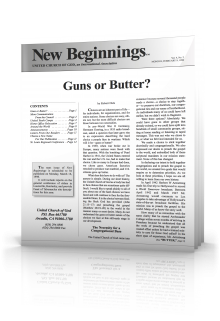Guns or Butter

In pre-World War II Germany, Hermann Goering, in a 1935 radio broadcast, asked a question that later gave rise to an expression describing the hard choice a people face in wartime: Which will it be—guns or butter?
In 1939, when war broke out in Europe, many nations were faced with that question. With the bombing of Pearl Harbor in 1942, the United States entered the war and the U.S. too, had to make that choice. Like so many in Europe had done, we chose guns. American factories retooled to produce war matériel, and U.S. citizens gave up butter.
What does this have to do with us? The answer is simple. During our short history, the United Church of God as a body has had to face choices that are sometimes quite difficult. I would like to speak plainly to all of you about one of the hard choices we have faced and will continue to face for the foreseeable future. It is the choice between feeding the flock God has provided (John 21:15-17) and preaching the gospel (Matthew 28:19-20) to the world in the manner many or most desire. Many do not understand the guns-or-butter nature of the choices we face at this still-early stage in our development.
The Necessity for a Congregational Base
The United Church of God came into existence because several thousand people made a choice-a choice to stay together—to preserve our doctrines, our congregational ties and our sense of brotherhood. As individuals many of us could have left earlier, but we didn't wish to fragment.
Were there options? Absolutely. We could have gone to other groups that already existed, or we could have split into hundreds of small community groups, sitting at home reading or listening to taped messages. This was not who we chose to be, or what we felt God intended for us.
We made a choice to stick together doctrinally and congregationally. We also expressed our desire to preach the gospel to the world, and embedded both of these scriptural mandates in our mission statement. None of this has changed.
In declaring our intent to hold together congregations and to preach the gospel to the world, we created two goals that would require us to determine priorities. As we look at these priorities, I hope we are all willing to learn from our own history.
In April 1942 Herbert W Armstrong made his first trip to Hollywood to record a World Tomorrow broadcast. Between April 1942 and March 1947 Mr. Armstrong would commute to Los Angeles to take advantage of Hollywood's state-of-the-art broadcast facilities. His mission was to preach the gospel to the world. Many of us know the story well.
How many of us remember with the same clarity that he started Ambassador College within seven months of arriving in Pasadena because he understood that all the work of preaching the gospel was wasted effort unless he had a trained ministry to care for those God called? In his short span of experience, Mr. Armstrong learned quickly that bodies of believers left unattended broke into factions and gradually disappeared.
Mr. Armstrong saw clearly that preaching a gospel message to the world without a structure in place to care for those called by God was an exercise in futility. The critical question is, do we understand this?
How many of us have read about and considered the choices he faced? On pages 139-140 in Volume 2 of his autobiography, Mr. Armstrong wrote, "As the work was growing, the need of additional trained help was becoming more and more apparent. Up to this time I had been holding nightly evangelistic campaigns in various towns and cities in Oregon and Washington.
"Nearly always there had been enough converts to organize a small church group. But there was no minister to pastor the little flock. Not one of them lasted longer than six months. I had to realize that sheep cannot endure without a shepherd" (emphasis mine). We face the same dilemma. We may be living 50 years later, but the issues have not changed.
The history of the fledgling Radio Church of God is not our only teacher. The comments that follow are not intended to demean anyone, they are cited because they are instructional to us, the members of the United Church of God.
The first significant work to spring from the Worldwide Church of God was the Church of God, International. Over a span of 20 years, the most recognized personality since Herbert W Armstrong preached coast-to-coast on weekly television. The viewing public was provided both face and name recognition, but no local congregational base to nurture those brought along by the TV messages and literature. The result? A church that saw a steady stream of members flowing through it, but which never grew beyond 6,000 in membership at its zenith.
The ministries that have sprung from the Worldwide Church of God since that time have been faced with similar choices. The few groups who could afford to make use of the media could not at the same time afford to provide the level of ministerial care they would wish for the congregational bodies created by their evangelistic effort.
The Differences in Our Circumstances
I have described above the critical parallels between the United Church of God and those groups who preexisted us, most importantly, our parent church. There are also some critical differences-differences that affect our ability, at this early stage of our existence, to do the same kind of work we became accustomed to seeing in the 60s, 70s and 80s.
Mr. Armstrong had the luxury of growing slowly, naturally. In the formative days of the Radio Church of God, congregations were not started until the number of people in an area had reached 50 or more. The reason was economics. Herbert W Armstrong, after nearly 30 years of preaching in person, through the printed word and over radio, cared for a church that was only a fifth the size of the United Church of God when it began. By the time the Radio Church of God reached 3,000 members, Ambassador College had been training potential ministers for 10 years. The Radio Church of God had years to lay a foundation for growth.
We didn't have that luxury when we began nearly three years ago. Across the nation and around the world people gathered in groups of all sizes-from a dozen or less in some places to over a hundred in many other places. We attempted to give personal care to as many of these congregational bodies as possible. We have had to choose how to spend the modest income we have been receiving. We chose to care for the congregations. It was not a light choice. It was a choice that history tells us is the right choice. At the time it was, and still is, a guns-or-butter choice.
Where to From Here—What About Now?
Many feel, now that we are nearly three years into our development, it is time to shift our priority and concentrate more effort on preaching the gospel. Consider something for a moment. To date, the United Church of God has preached the gospel through two stable media—the Good News with supporting booklets, and the advertising of Reader's Digest. We began in the fall of 1995 with an original print run of 15,000 copies of The Good News, all in English. Today, just over two years later, we are printing over 80,000 Good News magazines. Ten thousand of these are in Spanish, Italian, French and German. These tools have provided us with gradual, sustainable growth.
We have produced six booklets in the last two years—four have been translated into Spanish, German and Dutch, and two have been translated into French. We have two new booklets finished and ready to print, and over six additional booklets that could be brought to production within this year if it fits within our growth plans. As you know, we are also developing the Bible Study Course. For these efforts we budgeted $2.1 million for 1997/1998.
In a budget proposed for 1998/1999 the Council of Elders looked at adding money to the media budget with the understanding that any substantial additions would have to come about through manpower reductions. Some of this reduction would have to come from men currently serving congregational needs. Do you see how quickly we come to a guns-or-butter decision?
I believe most members of the United Church of God do not realize we currently cannot do any substantial television work without reducing some of our small congregations to unpastored video- or audiotape groups, or combining them, when possible, with other congregations. This goes against United's founding principles, and against the historic wisdom that Mr. Armstrong saw in the earliest days of starting churches in western Oregon and Washington: groups without pastors gradually disintegrate.
The Council of Elders has wrestled with this issue for the better part of two years. We have not been willing to reduce multiple small congregations to unpastored video groups, and compromise the care for other congregations, for the sake of a modest electronic-media presence at this time. This is a guns-or-butter choice.
When World War II broke out, citizens of many nations accepted rationing and shortages, and most supported the need to do without, because they understood why. We hope you will stand with us for the present as we move forward using the proven tools of the Good News magazine, booklets, and advertising in the Reader's Digest. We all desire to do a greater work, but we must move forward prudently, heeding the lessons learned from those who have gone before us.


